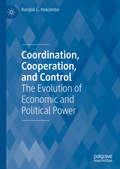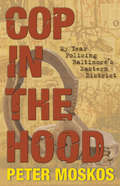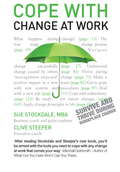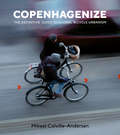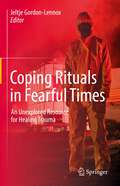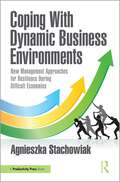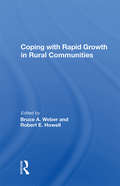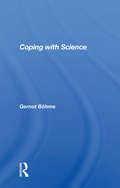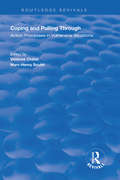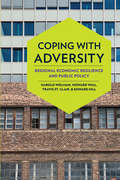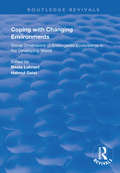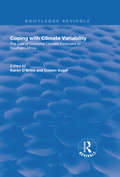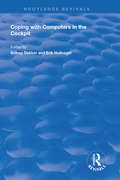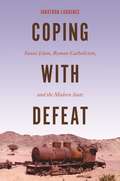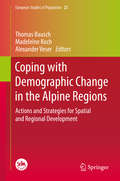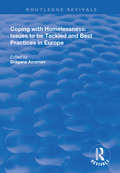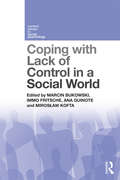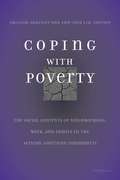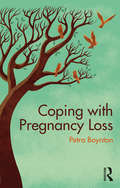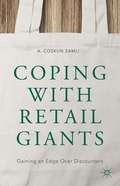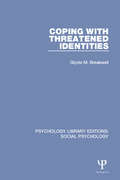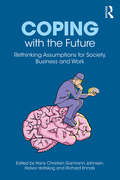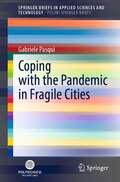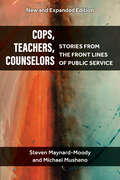- Table View
- List View
Coordination, Cooperation, and Control: The Evolution of Economic and Political Power
by Randall G. HolcombeThere are two ways people coordinate their actions: through cooperation, exercised by economic power, and through control, exercised by political power. When economic and political power are held by the same people, the result is stagnation; when those who hold economic power are not the same people who hold political power, the result is progress. This book presents the ways in which economic power and political power can be separated, and how they can remain so, by analyzing the nature of power and the differences between economic and political power. The book then discusses the history of economic and political power, including hunter-gatherer societies, agrarian societies, and modern commercial and industrial societies. This background lends insight into why political and economic power were typically held by the same people, and why recently those without political power have been able to acquire economic power. Incentives play a key role in understanding how those two types of power can become separated, and why there is always a tendency for them to recombine. But ideas also play a crucial role, including the influence of the Enlightenment, on the progress that has occurred in the last several hundred years.
Cop in the Hood: My Year Policing Baltimore's Eastern District
by Peter MoskosWhen Harvard-trained sociologist Peter Moskos left the classroom to become a cop in Baltimore's Eastern District, he was thrust deep into police culture and the ways of the street--the nerve-rattling patrols, the thriving drug corners, and a world of poverty and violence that outsiders never see. In Cop in the Hood, Moskos reveals the truths he learned on the midnight shift. Through Moskos's eyes, we see police academy graduates unprepared for the realities of the street, success measured by number of arrests, and the ultimate failure of the war on drugs. In addition to telling an explosive insider's story of what it is really like to be a police officer, he makes a passionate argument for drug legalization as the only realistic way to end drug violence--and let cops once again protect and serve. In a new afterword, Moskos describes the many benefits of foot patrol--or, as he calls it, "policing green."
Cope with Change at Work: A practical, positive companion for dealing with organisational change
by Sue StockdaleIn these turbulent economic times it seems that change is now, ironically, the only constant. If you have found that your job has changed (or been lost) in ways that you cannot control, then this is the book for you. Whether it's your manager, your job, your employment status, your working style, or your industry that's changing, this book is full of practical tips. And it's not written just for managers either - this book is written for people who are going through change, rather than those who are trying to implement it.
Cope with Change at Work: Teach Yourself Ebook Epub
by Clive Steeper Sue StockdaleIn these turbulent economic times it seems that change is now, ironically, the only constant. If you have found that your job has changed (or been lost) in ways that you cannot control, then this is the book for you. Whether it's your manager, your job, your employment status, your working style, or your industry that's changing, this book is full of practical tips. And it's not written just for managers either - this book is written for people who are going through change, rather than those who are trying to implement it.
Copenhagenize: The Definitive Guide to Global Bicycle Urbanism
by Mikael Colville-AndersenThe bicycle enjoyed a starring role in urban history over a century ago, but now it is back, stronger than ever. It is the single most important tool for improving our cities. Designing around it is the most efficient way to make our cities life-sized—to scale cities for humans. It is time to cement the bicycle firmly in the urban narrative in US and global cities.Enter urban designer Mikael Colville-Andersen. He has worked for dozens of global cities on bicycle planning, strategy, infrastructure design, and communication. He is known around the world for his colorful personality and enthusiasm for the role of bike in urban design. In Copenhagenize, he shows cities how to effectively and profitably re-establish the bicycle as a respected, accepted, and feasible form of transportation.Building on his popular blog of the same name, Copenhagenize offers vivid project descriptions, engaging stories, and best practices, alongside beautiful and informative visuals to show how to make the bicycle an easy, preferred part ofeveryday urban life.Copenhagenize will serve as inspiration for everyone working to get the bicycle back into our cities. It will give planners and designers the ammunition to push back against the Automobile Age and convince the skeptics of the value of the life-sized city. This is not a guide on how to become Copenhagen, but how to learn from the successes and failures (yes, failures) of Copenhagen and other cities around the world that are striving to become more livable.We need to act in order to save our cities—and us—from ourselves. Copenhagenize shows the path forward.
Coping Rituals in Fearful Times: An Unexplored Resource for Healing Trauma
by Jeltje Gordon-LennoxThis collection of articles reveals ritual to be a unique and powerful asset in healing trauma and broken relationships. Each contribution offers insights on how, in the face of uncertainty, threat and dislocation, human beings feel compelled to 'do something’, usually with or for others, to alleviate their anxiety, fears and sense of powerlessness. The editor and authors demonstrate how the imaginative processes at the heart of ritualmaking contribute to self- and group regulation by healing and mitigating the negative impact of trauma on individuals, collective groups, and even global systems. The authors are a group of remarkable scholars, researchers and practitioners who represent a diverse range of disciplines and subfields, including archaeology, Chinese studies, digital culture, ecological science, philosophy, psychology, psychotherapy, the politics of memory and the preservation of cultural heritage in wartime, ritual anthropology, social research, physics, research on traumatic stress, and peace studies. Students and researchers across the social and behavioural sciences will find this volume useful.
Coping With Dynamic Business Environments: New Management Approaches for Resilience During Difficult Economies
by Agnieszka StachowiakThis book discusses the existing management approaches for dealing with changes, namely readiness, maturity, and resilience. Although these concepts have been discussed for several years now, their importance grows when companies must deal with extended changes in economies. The changes are of a different nature: social, technological, and political, and they strongly impact every aspect of economies and companies’ activity. Is it possible to be ready for the changes? Should companies be resilient to disruption? These are the questions the managers are trying to answer, yet they need some support from academics. This book explores the synergy between the state-of-the-art knowledge and experience of companies to create a Contemporary Management Model. The scope of this book covers the methodology with an introduction and discussion of the key ideas and concludes with a presentation of the Contemporary Management Model followed by the practical validation and verification of the model based on case studies. This book is simply about developing the readiness and resilience of resources and processes, especially from a tactical perspective.
Coping With Rapid Growth In Rural Communities
by Bruce A. WeberThis book integrates the most current research findings on the economic, demographic, fiscal, and social consequences of rapid growth in rural communities and offers strategies that can be used to mitigate the often disruptive impact of that growth. While working extensively with government officials and citizens in rural communities, Drs. Weber and Howell became aware of the need for a compilation and synthesis of the research on rural growth; they subsequently invited scholars working in selected topic areas to contribute to that effort. The resulting papers were refined during a meeting sponsored by the Western Rural Development Center, edited, and brought together in this volume. Incorporating 1980 census data, the book outlines the spectrum of changes associated with rapid growth in rural areas, presents specific options for managing rapid growth, and suggests a model that communities can use for impact assessment and for monitoring the effectiveness of various management strategies.
Coping With Science
by Gernot BohmeGernot Böhme, a distinguished and original contributor to critical theory's philosophy of science project, sets out the main theses of this program in an important volume for science studies scholars. Stressing that science is a necessary aspect of advanced societies, Böhme explores the most fundamental questions about its social, political, and cultural roles in modern society. In light of the mixed blessings of technical society, Böhme questions whether we can continue to regard the institution of science as the top of a hierarchy of knowledge or as a neutral means of progress, let alone as a benign force for good. Science and its future are too important to be left to the scientists; society, Böhme insists, must take control of its scientific future.
Coping and Pulling Through: Action Processes in Vulnerable Situations (Routledge Revivals)
by Vivianne ChâtelOriginally published in 2004. Exclusion is a popular area of sociological research, with much analysis pointing towards survival practices and inclusion mechanisms as ways to cope with and confront exclusion. However, the question of what it means to act and how it is possible to do so from a vulnerable situation has yet to be properly addressed. This resourceful volume takes on this challenge, examining how to react and the measures to employ in instances of material and symbolic deprivation. It analyzes whether alliances can be formed and their potential benefit, and discusses which supports are available despite structural inequality and no opportunity for reciprocation. Drawing together illustrative case studies from across Europe, the contributors consider in depth how a community or individual can take support from a spoiled identity and transform both it and the physical situation. This illuminating volume also includes discussions of living without support, security of living conditions and dignity, claims for citizenship, collective action, continuity and survival. It proposes an innovative and groundbreaking theory for 'weak' action.
Coping with Adversity: Regional Economic Resilience and Public Policy
by Howard Wial Harold Wolman Travis St. Clair Edward HillCoping with Adversity addresses the question of why some metropolitan-area regional economies are resilient in the face of economic shocks and chronic distress while others are not. It is particularly concerned with what public policies make a difference in whether a region is resilient. The authors employ a wide range of techniques to examine the experience of all metropolitan area economies from 1978–2014. They then look closely at six American metropolitan areas to determine what strategies were employed, which of these contributed to regional economic resilience, and which did not. Charlotte, North Carolina, Seattle, Washington, and Grand Forks, North Dakota, are cases of economic resilience, while Cleveland, Ohio, Hartford, Connecticut, and Detroit, Michigan, are cases of economic nonresilience. The six case studies include hard data on employment, production, and demographics, as well as material on public policies and actions. The authors conclude that there is little that can done in the short term to counter economic shocks; most regions simply rebound naturally after a relatively short period of time. However, they do find that many regions have successfully emerged from periods of prolonged economic distress and that there are policies that can be applied to help them do so. Coping with Adversity will be important reading for all those concerned with local and regional economic development, including public officials, urban planners, and economic developers.
Coping with Changing Environments: Social Dimensions of Endangered Ecosystems in the Developing World (Routledge Revivals)
by Helmut Geist Beate LohnertFirst published in 1999. A collection of empirical research and theoretical reflection on the modelling of environmental change from a social perspective. The focus is on the endangered ecosystems in the developing world and examples are given from Asia, Africa and Latin America. After Regions at Risk (Kaspersons et al, 1995 UNO University Press) it is the second compilation that focuses on regional empirical evidence with regard to Global Environmental Change. On a national and European level, it gives an overview of regional studies coming from the first German Priority Programme on the Social Dimensions of Global Environmental Change. The introductory and concluding parts of the book reflect the strictly interdisciplinary approach of the research programme and form a step towards the understanding of human driving forces and responses to Global Change rooted in regional transformation processes. The book offers a source of information and theoretical guidelines for the newly evolving scientific community of Global Change Research; including teachers, politicians and anyone involved in social and environmental policy and planning.
Coping with Climate Variability
by Colleen Vogel Karen o'BrienThis title was first published in 2003. Recent food shortages in Southern Africa, induced by rainfall variability but compounded by problems of governance and rising food prices, have resulted in massive relief efforts. A recent scientific innovation - supplying farmers with seasonal climate forecasts - has been touted as a way to increase preparedness for such situations. This book examines how climate forecasts are used by the agricultural community in Southern Africa. Based on a workshop funded by the World Bank, it covers a broad set of issues related to the use of seasonal forecasts, including factors that constrain users' capacities to respond. Case studies presented in the book explore how forecasts can potentially increase production and food security among a population highly dependent on agriculture and vulnerable to climate variability. The book reflects on how the production, delivery and uptake of seasonal forecasts might be improved, as well as the limitations to their usefulness, and it should catalyse future thinking and research in this field.
Coping with Computers in the Cockpit (Routledge Revivals)
by Erik Hollnagel Sidney DekkerFirst published in 1999, this volume examined how increasing cockpit automation in commercial fleets across the world has had a profound impact on the cognitive work that is carried out on the flight deck. Pilots have largely been transformed into supervisory controllers, managing a suite of human and automated resources. Operational and training requirements have changed, and the potential for human error and system breakdown has shifted. This compelling book critically examines how airlines, regulators, educators and manufacturers cope with these and other consequences of advanced aircraft automation.
Coping with Defeat: Sunni Islam, Roman Catholicism, and the Modern State
by Jonathan LaurenceThe surprising similarities in the rise and fall of the Sunni Islamic and Roman Catholic empires in the face of the modern stateCoping with Defeat presents a historical panorama of the Islamic and Catholic political-religious empires and exposes striking parallels in their relationship with the modern state. Drawing on interviews, site visits, and archival research in Turkey, North Africa, and Western Europe, Jonathan Laurence demonstrates how, over hundreds of years, both Sunni and Catholic authorities experienced three major shocks and displacements—religious reformation, the rise of the nation-state, and mass migration. As a result, Catholic institutions eventually accepted the state’s political jurisdiction and embraced transnational spiritual leadership as their central mission. Laurence reveals an analogous process unfolding across the Sunni Muslim world in the twenty-first century.Identifying institutional patterns before and after political collapse, Laurence shows how centralized religious communities relinquish power at different rates and times. Whereas early Christianity and Islam were characterized by missionary expansion, religious institutions forged in the modern era are primarily defensive in nature. They respond to the simple but overlooked imperative to adapt to political defeat while fighting off ideological challenges to their spiritual authority. Among Laurence’s findings is that the disestablishment of Islam—the doing away with Islamic affairs ministries in the Muslim world—would harm, not help with, reconciliation to the rule of law.Examining upheavals in geography, politics, and demography, Coping with Defeat considers how centralized religions make peace with the loss of prestige.
Coping with Demographic Change in the Alpine Regions: Actions and Strategies for Spatial and Regional Development (European Studies of Population #23)
by Thomas Bausch Madeleine Koch Alexander VeserEurope's population is ageing and decreasing. Demographic change is making not only regional and territorial adaptation necessary, but also new region-specific spatial planning and regional development. This publication focusses on demographic change and its implications for the economy and social systems in the Alpine areas, which differ widely from their surrounding metropolitan areas. It provides a specific regional in-depth study in order to help establish suitable adaptation and development programs. It covers various aspects including demographic analysis, onsite participatory strategies and implementation processes, as well as generalized adaptation strategies. Reports on pilot actions in various regions across the Alps demonstrate how demographic change can be approached from a practitioner's perspective. The volume is based on the results of the project DEMOCHANGE, which was co-funded by the European Regional Development Fund in the frame of the European Territorial Cooperation "Alpine Space" program.
Coping with Homelessness: Issues to be Tackled and Best Practices in Europe (Routledge Revivals)
by Dragana AvramovFirst published in 1999. The phenomenon of homelessness is not new, but it has only recently been perceived as a social problem in European Member States. Even in the early 1990s little was known about the paths in and out of homelessness. This volume presents the papers arising from EUROHOME: Emergency and Transitory Housing for Homeless people: Needs and Best Practices. This project enabled a review of the state of knowledge in the field, an analysis of recent trends and a discussion of the prospects for improvement in the prevention of homelessness and the public response to housing in Europe. EUROHOME, and this collection, thus bring together experts in the study of: *
Coping with Lack of Control in a Social World
by Ana Guinote Immo Fritsche Marcin Bukowski Mirosław KoftaCoping with Lack of Control in a Social World offers an integrated view of cutting-edge research on the effects of control deprivation on social cognition. The book integrates multi-method research demonstrating how various types of control deprivation, related not only to experimental settings but also to real life situations of helplessness, can lead to variety of cognitive and emotional coping strategies at the social cognitive level. The comprehensive analyses in this book tackle issues such as: Cognitive, emotional and socio-behavioral reactions to threats to personal control How social factors aid in coping with a sense of lost or threatened control Relating uncontrollability to powerlessness and intergroup processes How lack of control experiences can influence basic and complex cognitive processes This book integrates various strands of research that have not yet been presented together in an innovative volume that addresses the issue of reactions to control loss in a socio-psychological context. Its focus on coping as an active way of confronting a sense of uncontrollability makes this a unique, and highly original, contribution to the field. Practicing psychologists and students of psychology will be particularly interested readers.
Coping with Poverty: The Social Contexts of Neighborhood, Work, and Family in the African-American Community
by Sheldon Danziger Ann Chih LinConservatives often condemn the poor, particularly African-Americans, for having children out of wedlock, joblessness, dropping out of school, or tolerating crime. Liberals counter that, with more economic opportunity, the poor differ little from the nonpoor in these areas. In answer to both, Coping with Poverty points to the survival strategies of the poor and their multiple roles as parents, neighbors, relatives, and workers. Their attempts to balance multiple obligations occur within a context of limited information, social support, and resources. Their decisions may not always be the wisest, but they "make sense" in context. Contributors use qualitative research methods to explore the influence of community, workplace, and family upon strategies for dealing with poverty. Promising young scholars delve into poor black inner-city neighborhoods and suburbs and middle-income black urban communities, exploring experiences at all stages of life, including high-school students, young parents, employed older men, and unemployed mothers. Two chapters discuss the role of qualitative research in poverty studies, specifically examining how this research can be used to improve policymaking. The volume's contribution is in the diversity of experiences it highlights and in how the general themes it illustrates are similar across different age/gender groups. The book also suggests an approach to policymaking that seeks to incorporate the experiences and the needs of the poor themselves, in the hope of creating more successful and more relevant poverty policy. It is especially useful for undergraduate and graduate courses in sociology, public policy, urban studies, and African-American Studies, as its scope makes it THE basic reader of qualitative studies of poverty.
Coping with Pregnancy Loss
by Petra BoyntonPregnancy loss can leave us with many unanswered questions, and knowing where to find answers is not always clear. This book is for you if, like me, you’ve been affected by any kind of pregnancy loss – currently or in the past. It provides practical advice and self-care strategies to help you cope during or after loss, alongside ideas that will enable you to make sense of what’s happened – including understanding your feelings and choices; outlining what you can expect during and after your loss; ways to navigate physical and mental health care (if appropriate); and thinking about how to remember your baby. It’s for charities, support groups, therapists, and healthcare professionals who want to provide support and care. We all react – and cope with loss – in different ways, and this book respects diverse needs when it comes to getting information and help. You don’t have to feel like you are going through your loss alone. In this book you’ll find reflection exercises, self-help resources, and stories and suggestions from other people about how they survived, which should leave you feeling more confident and better able to seek additional support if you need it.
Coping with Retail Giants
by A. Coskun SamliIn the retail jungle dominated by giants like Walmart and Costco, survival for small and medium sized retailers will require a major shift from the traditional strategy of merchandise management to focus on generating customer value. Coping with Retail Giants critically analyzes the modern retail market and identifies how businesses gain the competitive edge over the major retailers that currently control the market. Samli argues that as society advances economically, consumers will seek better values generated by the retailing sector. This powerful stimulus will accelerate the retail revolution and be primarily carried out by entrepreneurial retailers-managers in small and medium sized retailing. Samli blends retail theory and practice to present a new model for retailing that delivers customer value, and ultimately, retail success.
Coping with Threatened Identities (Psychology Library Editions: Social Psychology #5)
by Glynis M. BreakwellPeople cope with threats to their identities in many different ways. Until the original publication of this title in 1986, there had been no theoretical framework within which to analyse their strategies for doing this, or to examine the nature and impact of the threatening experiences themselves. In this elegant and original book, Glynis Breakwell proposes an integrative model which explores the structure of identity and the principles directing its development. Focusing on examples of threat such as unemployment, sexually atypical employment and ethnic marginality, Breakwell examines the relation of the individual to social change. Through her sensitive use of case studies, she enables the victims of threat to speak for themselves about their experiences and feelings. Their reactions illustrate her proposed framework of three levels of coping strategies – intra-psychic, interpersonal and intergroup – and her assessment of the factors which limit the success of such strategies. The case studies also point to new evidence on the effects of unemployment and the impact of youth training schemes at the time. This title would have been essential reading for a range of undergraduate courses in social and abnormal psychology and individual differences, as well as for postgraduate training in clinical and medical psychology at the time. Social workers, counsellors and all those concerned with the care of the sufferers of threatened identities will still find it both informative and influential.
Coping with the Future: Rethinking Assumptions for Society, Business and Work
by Richard Ennals Halvor Holtskog Hans Christian Garmann JohnsenCoping with the Future has been written in response to widespread international awareness that the future is not predictable. In political and economic terms, we are in unknown territory, with daily developments around Brexit and the Trump Presidency, and "Kodak moments" in business. On the other hand, business leaders demand certainty, which is not available. This book redefines the nature of modern business. In contrast to recent trends, it has a focus on human-centred manufacturing and on decision-making which goes beyond a focus on short-term profit. The liberal capitalism of the USA and the UK is not the only current variety of capitalism. Business is not just about managers, but requires participation and engagement by workers. Since the financial crash of 2008, there has been much talk about the need for fresh approaches to business, but little has changed. This book pulls together current research and practice and poses new questions based on case studies. There is no one simple best way, but an uncertain future can be addressed, drawing on diverse past experience and cases. The book addresses an intended audience in business and universities, including business schools, around the world. The debate takes a broader approach, involving research in the social sciences and approaches from philosophy. The world has always been unpredictable, but we have allowed ourselves to be comforted by convenient myths. It is time to wake up.
Coping with the Pandemic in Fragile Cities (SpringerBriefs in Applied Sciences and Technology)
by Gabriele PasquiThis book explores the effects of covid-19 crisis on cities and urban areas and proposes approaches and solutions to invert the pandemic's negative impact. The covid-19 crisis has had significant impacts on public health, on the everyday lives of millions of people, and on the use of urban spaces at all levels. All over the world, cities have been at the forefront of a crisis that have worsened socio-spatial inequalities between regions and inside urban areas. The book examines three aspects of the connection between pandemic and urban issues: the relevance of spatial and territorial variables in the explanation of pandemic dynamics and consequences in fragile cities; the assumption of radical uncertainty as the conceptual framework for a new approach to urban planning, in a phase of raise of public investments; and the design of urban policies aimed at facing the material and symbolic effects of pandemic on the practices of use of spaces and places, in a context characterized by a plurality of populations and forms of life.
Cops, Teachers, Counselors: Stories from the Front Lines of Public Service
by Steven Williams Maynard-Moody Michael Craig MushenoThe new edition of Cops, Teachers, Counselors furthers the exploration of forces that shape the contours of frontline work. This line of inquiry is at the heart of street-level bureaucracy research, a field of study cutting across disciplines, including public administration, political science, social work, law and society, education, and criminal justice. The oft-cited 2003 edition pioneered a qualitative method of inquiry using workers’ own voices and storytelling about fairness in the delivery of services. This NSF-supported field research reveals the ways workers engage in moral judgments, more than implementing laws and policies, to account for their decisions and actions. The new edition wraps an expanded framing around the original chapters, while maintaining a lively, approachable presentation style. It takes on a more enriched perspective of legality than the original, while retaining a focus on frontline work as a powerful source of cultural ordering. In addition to examining workers’ stories of encounters, attention is given to the agency of the governed during interactional moments, the power dynamics in play during both interpersonal and group encounters, and patterns of practice that converge across distinctive service domains. The original edition describes two narratives that shape frontline workers’ decisional judgments and the interplay between legality and morality: the state-agent and citizen-agent narratives. This edition adds the knowledge-agent narrative that stresses the importance of professional and field learning to decisional judgments. The book examines routine encounters of cops, teachers, and counselors with diverse publics when questions of justice and fairness are at play. This new edition speaks to contemporary issues at a time when frontline workers gained broad recognition for their heroic contributions to communities during the Covid 19 pandemic, as well as sustained condemnation for their embodiment of the brutal expression of racialized state power in police actions. The authors conclude with a focus on the significance of place and trust in building social inclusion on the frontlines of public service.
